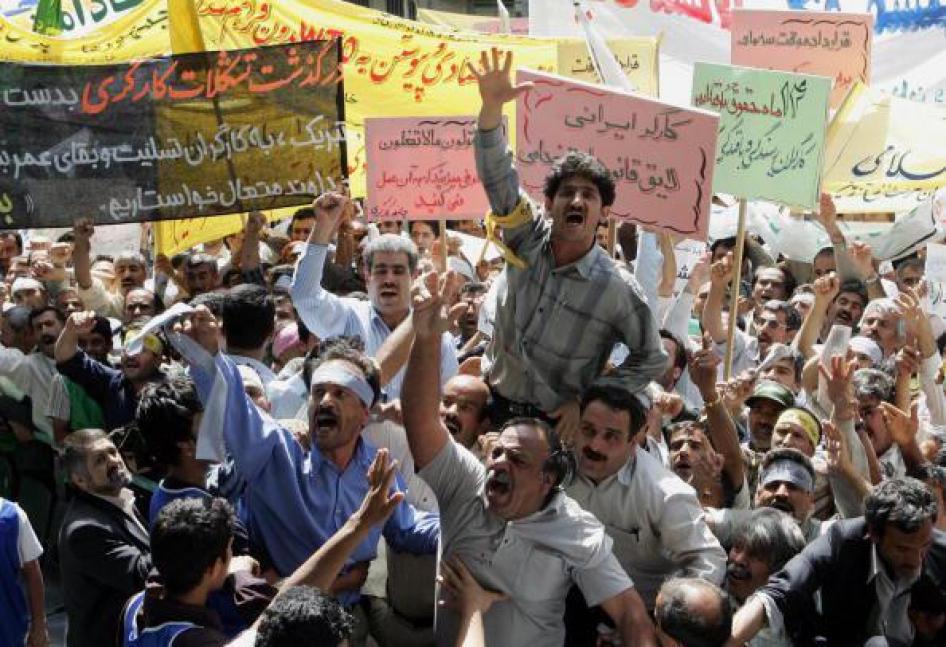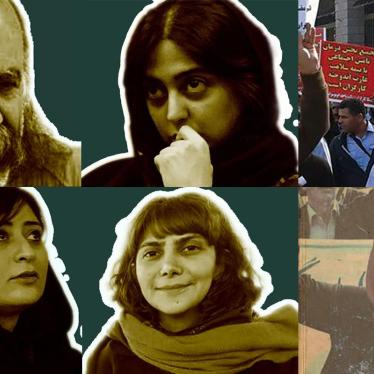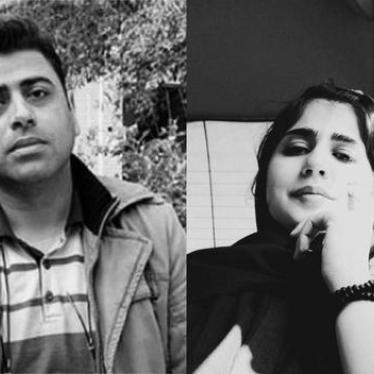(Beirut) – Iran’s judiciary is dramatically increasing the costs of peaceful dissent in Iran, Human Rights Watch said today. Since July 31, 2019 alone, revolutionary courts have sentenced at least 13 activists to prison sentences of more than a decade for peaceful dissent.
“Again and again, Iranian revolutionary court judges have been ensuring that anyone who dares challenge the authorities will pay a draconian price,” said Michael Page, deputy Middle East director at Human Rights Watch. “When activists who raise issues that concern many Iranians are crushed with such harsh sentences, the judiciary’s promise of combating wrongdoing becomes a mockery of justice.”
In just the most recent cases, on September 7, a revolutionary court sentenced six labor rights activists to sentences ranging from 14 to 19 years. On August 27, the lawyer for a 22-year-old woman who had protested compulsory hijab announced that she had been sentenced to a total of 24 years. On July 31, a revolutionary court sentenced three other women detained for protesting compulsory hijab laws to sentenced ranging from 11 to 18 years.
On August 24, the lawyer for Kioomars Marzban, a satirist who has been in pretrial detention for a year, tweeted that his client has been sentenced to 23 years. Similarly over the past two weeks, a journalist and an activist arrested during a peaceful May day protest have been sentenced to more than 10 and 11 years in prison, respectively.
In each case, if the sentence is upheld, the person will have to serve the harshest sentence among the charges for which they have been convicted.
The campaign to support the prisoners of Haft Tappeh (sugar cane company) reported the September 7 sentences, including for Ismael Bakhshi, a prominent labor rights activist sentenced to 14 years, and Sepideh Gholian, a journalist and labor rights activist, sentenced to 19 years and 6 months. Both have been held since January 20. The charges, as cited by Human Rights Activists News Agency, HRANA, were all for nonviolent acts, including "assembly and collusion to act against national security," "membeship in an illegal group of Gam," an online publication, "propaganda against the state," and "publishing false news."
The authorities had arrested Bakhshi and Gholian after they alleged that they had been tortured when they were detained in the aftermath of sugarcane factory labor protests in November 2018.
The campaign’s Twitter account also reported that Amir Amirgholi, Sanaz Allahyari, Asal Mohammadi, and Amir Hossein Mohammadifar, members of the editorial board of the online publication Gam and who have also been detained since January, have been sentenced to 18 years each in prison on similar charges. If the verdicts are upheld, each of the six labor rights defenders has to spend seven years in prison.
On August 31, HRANA reported that Branch 28 of Tehran’s revolutionary court had sentenced Atefeh Rangriz, a labor rights activist detained in Qarchak prison near Tehran since May 1, to 11 years and 6 months in prison and 74 lashes on charges that include “assembly and collusion to act against national security,” “propaganda against the state,” and “disrupting public order.”
On August 24, the family of Marizeh Amiri, a journalist with the Shargh daily paper who was also arrested on May 1, reported that Branch 28 of the revolutionary court had sentenced her to 10 years and 6 months in prison and 148 lashes. HRANA reported that Amiri faced charges that include “assembly and collusion to act against national security,” “propaganda against the state,” and “disrupting public order.” If the sentences are upheld, Rangriz and Amiri must serve 7.5 and 6 years in prison respectively.
On August 27, Hossein Taj, tweeted that his client Saba Kordafshari, a 22-year-old-woman who was arrested for protesting compulsory hijab, has been sentenced to 15 years in prison for “encouraging and providing for [moral] corruption and prostitution,” seven and a half years for “assembly and collusion to act against national security,” and one and half years for “propaganda against the state.” If the sentences are upheld, she will have to serve 15 years.
On July 31, Branch 31 of Tehran’s revolutionary court sentenced Yasman Ariani, her mother Monireh Arabshahi, and Mojgan Keshavarz (who were all arrested for protesting compulsory hijab laws) to 5 years for “assembly and collusion to act against national security,” one year for “propaganda against the state,” and 10 years for “encouraging and providing for [moral] corruption and prostitution.” The court sentenced Keshavarz to an additional seven and a half years for “insulting the sacred.” If these sentences are upheld on appeal, each woman would serve 10 years.
On August 24, Mohammadhossein Aghasi tweeted that branch 15 of Tehran’s revolutionary court had sentenced Marzban, a 26-year-old satirist, to 23 years in prison. Aghasi said that Marzban, who worked with multiple news websites when he lived outside the country before returning to Iran in 2017, had been convicted of charges including “cooperating with an enemy state.” Marzan has also been convicted of insulting authorities and sacred beliefs. If his sentence is upheld, he will serve 11 years.
On September 8, Mizan News, the judiciary’s news agency, reported that Ayatollah Raeesi, the head of the judiciary, ordered that “some of the recent cases will be tried fairly at the appeals level.” It appears that the order was communicated with regards to the conviction of the labor activists, but the judiciary has not shared any more details.
Earlier this year, on March 11, authorities sentenced Nasrin Sotudeh, a prominent human rights lawyer to 33 years in prison and 148 lashes for her peaceful activism including defending women who protested compulsory hijab laws. On April 23, the court of appeal upheld the sentence. Sotoudeh, who has been detained since June 2018, has to serve 12 years in prison.
Iran’s labor law does not recognize the right to create labor unions independent of government-sanctioned groups such as the Islamic Labor Council. Since 2005, authorities have repeatedly harassed, summoned, arrested, convicted, and sentenced workers affiliated with independent trade unions.
Article 22 of the International Covenant on Civil and Political Rights (ICCPR) and Article 8 of the International Covenant on Economic, Social, and Cultural Rights (ICESCR) protect the right to form and join labor unions. Iran is a party to both treaties. Iran is also a member of the International Labour Organization (ILO).









